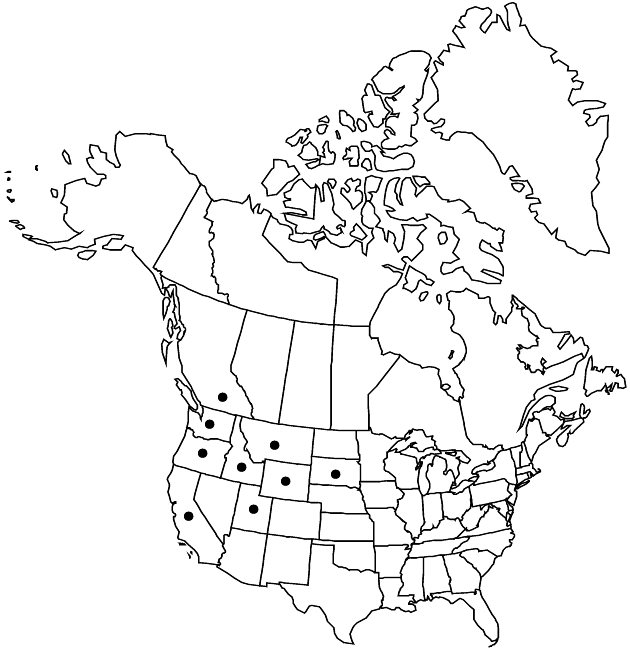Eurybia merita
Phytologia 77: 260. 1995.
Plants (2–) 10–50 cm, clonal and clumped, eglandular; rhizomes creeping to ascending, long or short, scaly, woody with age. Stems 1–3+, usually ascending, sometimes decumbent, purplish, occasionally branched basally, sparsely villosulous, densely so distally. Leaves cauline (dark green abaxially, paler bluish green adaxially) firm, ± markedly veined, margins entire or serrulate, scabrous to strigoso-ciliate, teeth mucronate, slightly indurate, apices obtuse to acute, mucronate, abaxial faces glabrescent to sparsely villous along veins, adaxial glabrescent or sparsely (proximal) to ± densely (distal) villoso-strigose or strigose; proximalmost withering by flowering; proximal narrowly winged-petiolate or sessile, petiole bases sheathing, blades spatulate to obovate or oblanceolate, 10–43 × 2–16 mm, smaller than mid, bases attenuate to cuneate, subclasping (if sessile); mid sessile, blades lanceolate or oblong-lanceolate to oblanceolate, narrowly obovate, or spatulate, 20–80 × 4–35 mm, gradually reduced distally, bases rounded or subauriculate to widely attenuate or cuneate; distal (arrays) sessile, lanceolate to lanceovate or elliptic to oblanceolate, 6–52 × 1–17 mm, rapidly reduced distally, margins often slightly purplish. Heads (1–) 5–50, usually in open to compact, corymbiform arrays, rarely borne singly. Peduncles villosulous; bracts 0–3, lanceolate to spatulate, leaflike to distally phyllary-like (bases indurate, margins purplish), mostly foliaceous. Involucres campanulate, 6–9 mm, shorter than pappi. Phyllaries 30–65 in 4–5 series, often purplish, oblong or lance-oblong (outer) to lance-linear or linear (inner), unequal, membranous, bases indurate, rounded, dark green zones diffusely diamond-shaped to lanceolate in distal 1/3–2/3 (outer, seldom foliaceous) to 1/5 or none (inner), margins ± dark purple, narrowly scarious, erose, densely villoso-ciliate, apices appressed or sometimes loose and ± squarrose, acute to obtuse, often apiculate, faces usually villous, rarely glabrous. Ray-florets (10–) 14–32; corollas purple to violet, 7–12 (–15) × 1–1.7 mm. Disc-florets 30–60; corollas pale to cream-yellow, lobes pink-tinged, 5–7.6 mm, slightly ampliate, tubes equaling or slightly longer than funnelform throats, lobes erect, triangular, 0.6–1.3 mm. Cypselae brownish, fusiform-obconic, slightly compressed, ca. 3.4 mm, ribs 8–10 (pale, strong), strigillose; pappi of cinnamon to yellowish bristles 5–6 mm, longer than disc corollas. 2n = 36.
Phenology: Flowering late summer.
Habitat: Open, mesic or dry, rocky areas and woods, clearings, burnt areas, creek banks (rocky, sandy, or gravelly), mostly at subalpine level in mountains, lower in north, Douglas fir, lodgepole pine or spruce forests, subalpine meadows
Elevation: 100–3200 m
Distribution

B.C., Calif., Idaho, Mont., Oreg., S.Dak., Utah, Wash., Wyo.
Discussion
Eurybia merita occurs mainly from the Interior Mountains and Plateaus system to the Rocky Mountains, and is disjunct to the Black Hills of South Dakota. It reaches California in Siskyou County; the species has been overlooked in this state (e.g., G. A. Allen 1993) because of misidentification with E. radulina. S. L. Welsh et al. (1987) reported E. sibirica from the Uinta Mountains of Utah (Summit County), which A. Cronquist (1994) attributed to var. merita.
Selected References
None.
Lower Taxa
"[" is not declared as a valid unit of measurement for this property."]" is not declared as a valid unit of measurement for this property.